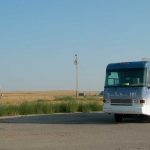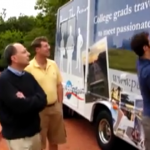I received an email from Jonna Sotelo, a real estate agent that had come across what we were doing, and referred me to her sister, Nicole, for a possible interview in Chicago. In my exchange with Nicole I learned a few things from our correspondence.
1) She was passionate for making a difference through striving for women’s equality within the Catholic church.
2) At age 28, she recently was coming off a battle with cancer.
3) She graduated from Harvard with a full tuition scholarship.
 Needless to say, it was enough to get our attention, and little did I know that this brief description hardly scratched the surface.
Needless to say, it was enough to get our attention, and little did I know that this brief description hardly scratched the surface.
Nicole’s passions can be traced to her childhood, where her characteristics and interests originated through education and family. Her father is Chicano, (Mexican-American) and while he was growing up in a minute town in Arizona, he was subject to a lot of discrimination and suffering. She often heard stories about how her grandfather helped to unionize the mines he worked in, and how her father had struggled to make it through education as a minority.
“I would have to say that my passion for justice and struggle came from him,” Nicole proclaims in the Starbucks on North Michigan Avenue where we met.
Nicole’s passion for religion can be accredited to her mother’s deep spirituality, whose faith trickled down and was instilled within her daughter. One of her first experiences that sparked her passion for religion happened in third grade, when a priest came into her class to ask if anyone wanted to be an alter server in the church. Nicole thought to herself that she would love to be an alter server, but the priest chose only boys. It was the first time that she had been discriminated within her faith based on her gender, and the fire inside her was ignited.
When it came time to go to college, Nicole ended up moving from Arizona to Massachusetts to attend Wellesley, an all women’s school with notable alumni including Hilary Rodham Clinton and Madeline Albright. The school has a legacy for women that have pursued their passion, and was the place where Nicole discovered and developed her passions.
Nicole went into the undergraduate program wanting to become a teacher, but after going through some courses she realized that obtaining a little more “life experience” might be in order before devoting herself to the profession. She majored in English literature and Religion, and as graduation approached Nicole was forced to face the inevitable question, “What do I want to do with my life?”
Out of interest, she enrolled in a course called “New Testament Studies,” in which she realized that she loved learning about the New Testament from both a historical and social perspective. The course had such an impact that she decided to double major in English Literature as well as Religion, and Nicole’s passion moved her closer to answering the question.
Once out of school and faced with the heavy burden of paying back student loans, she worked at Bank of America for one year in San Francisco to relieve the financial obligation. The following year she worked at NETWORK, a Catholic Social Justice Lobby, in Washington, D.C.. But her love for education came back and she felt the urge to go to graduate school. Wanting to go to a divinity school, she applied to four schools, and was accepted to all four. Two of those schools (Yale and Harvard) offered full tuition scholarships, and she eventually went with Harvard because of their Women and Religion Center.
She spent three years at Harvard expanding her educational horizons, and upon graduation she started to work on pursuing her passion of addressing the need for justice within the Catholic Church. Additionally, Nicole wanted to fight for women’s equality while helping women that have been abused. She decided to do this in a number of ways, one being in the form of a book that was released in November for Christian women that have been abused in domestic violence situations, and the other was joining the non-profit organization Call to Action.
But there was one minor setback to her desire to make a difference, and that came in the form of melanoma, the deadliest form of skin cancer that had developed on her right leg at the young age of 27. The phone call came when Nicole was about to go down to Mexico, but the doctor told her that she needed to drop everything and have surgery.
If she had gone to Mexico, the cancer could have spread to a lymph node and she could have been facing a death sentence today. Fortunately, the doctors did catch the cancer in time and Nicole started the process of rehabilitating. Because her leg had been in a cast for so long, she even had to learn how to walk again. And this long, unexpected journey all came at a time where she had just graduated from Harvard, was diligently working on a book to address the key issue on the abuse of women, and was looking forward to joining a meaningful non-profit organization dedicated to activating justice in society and within the church.
Regardless of the unfortunate situation, Nicole faced it just like she has faced other topics which society avoids addressing. Topics such as domestic abuse, justice and war and has gone on with her life. She was able to start working for “Call to Action,” a few months later. She wears many hats within the organization including Church Reform Organizer and Media Relations Coordinator. She is also actively involved in a group made up of young adults ages 20-30 who have the common goal of bringing justice not only within the Catholic church, but society as well.
As we neared the end of our interview, almost on cue as she was delivering her last words about letting your voice be known, the song playing at Starbucks coincidentally switched to Bob Marley’s “Get Up, Stand Up, Stand Up For Your Rights.” The song was representative of Nicole and all the positive energy and passion she has put into her work.
Here are a few quotes about what Nicole had to say in her mission to make a difference, the importance of using your voice, and passion.
“People that are pursuing their passion is not just a matter of looking at their own gifts, but it is also looking at the suffering of the world, and being motivated to combine those two things together. I think that is what we are all called to do. You have to look at your gifts, look at suffering, and combine the two to make a difference. And when you have a passion, money isn’t the most important thing. It’s about bringing about justice. That’s where the real riches are.”
On her motivation to continue her quest to make a difference in the Catholic Church…
“I believe that if the Catholic Church becomes more just, then it will influence society to become more just themselves.”
On the advice that she gives to students:
“I would tell students that first of all you’re a student, and you have so much opportunity and education open to you in the United States that most people your age only dream about. Probably ninety percent of the world or more never gets past elementary school. So I would say embrace your opportunity for education, and use that time of education as a real time to discern what your gifts truly are. Figure out what you enjoy doing, what am I talented in, and look around to see what touches you the most in the world. Then use those gifts to address what touches you.”
One of the things that Nicole stressed to us in the interview is that everyone has a voice, and encouraged everyone to use that voice to provoke positive change. Nicole is using her voice to address the suffering of women’s equality, rights for gay people, and the awareness of women’s abuse in war. Again, stressing the importance of making your voice heard, she offered a way that this could happen. One way is to call the White House comment line, because they do keep track of the calls coming in. She wanted us to post their number, just in case any of you wanted to voice your opinion. She whipped out her little black book and flipped to the politics page, where she gave us the number to dial. You can reach the White House Comment Line at (202) 456-1111, and if you want to call the House of Representatives or their Senators, you can dial the Congressional Switchboard 202 224-3121. You can say I’m from Arizona and I want to talk to my senators, and they’ll direct them to you.
PTP Commentary: This interview opened my eyes up to things that I never would have thought about, and never would voluntarily think about either. Some of this stuff was very heavy, but it was reality. Through Nicole’s passion and suffering to make use of the life she has, despite recognizing the fact that there probably won’t be a drastic change within the church in her lifetime was truly inspiring. As a society, we tend to turn our backs on the important issues that were brought up in this write-up, like abuse and inequality, and some of us don’t even think that this stuff still goes on today.
Nicole started talking about a small success story that happened in the spring of 2006, where one of two bishops in the U.S. still refused to let girls serve as alter servers, even though the Pope allowed women to serve. Groups held vigils outside of a church and staged other actions for years, The bishop finally relinquished and allowed ladies to serve, as alter servers. It’s just small things like women’s equality that you would never think still goes on today.
Interview
Went to Harvard because that’s where they had their center for Women & Religion. So I knew I’d be able to pursue my passion for women’s equality there. My work would be globalizing people and doing a lot of activism.
Hilary Rodham went to Wellsley. So did Nicole. Originally went in thinking she’d do teaching and changed her mind because she needed more life experience. Kept the English lit degree. Took a religion course in New Testament. Loved it from a faith and historical perspective. What a radical revolutionary Jesus really was. It was a great inspiration.
My passion came from two strands in my family. My father is Chicano, meaning Mexican American and was born in the United States. He’s experienced a lot of discrimination growing up in a mining town in Arizona. I hear stories from him and my grandfather about how they tried to unionize the mines as a minority. My passion for justice and struggle came from him.
My mother had a very deep spiritual faith. She was Catholic. From her I feel that I gained a sense of deep spirituality. So I have interwoven the justice thread from my father, and the spirituality thread from my mother and have brought the two together in my own place and passion for work.
There’s definitely a need for justice in the Catholic church. If the Catholic church can be more just, it will have it’s influence on society and society will be more just.
Call to Action. We’re about to celebrate our 30th anniversary. We work on issues of justice in church and society. We have 53 local chapters. I work there as one of their church reform organizers. Media relations coordinator. I also work on our next generation program, which is for people in their twenties and thirties who are wanting to following Christ and act for justice in society and for the church.
I have a book coming out. It’s for women who have been abused in domestic violence situations. It’s definitely a passion for mine.
Women’s equality and justice is a thread throughout all my work. Not only church reform work, but also for women who have been abused.
Get up, stand up. Stand up for your rights.
Women are often being beaten or killed. I’m really trying to help bring the issues to the forefront. Particularly to encourage the Catholic bishops to take a stand.
Look at what happened to women before, during and after war. If you did, our code of ethics would be very different. For example, if you look at the probability of the success of the war, you’d probably just see the success when the war finishes. But for women who have been abused, often times the abuse begins when the men come home from war. Really, the battlefields shift from the battlefield to the women’s homes. They experience domestic violence in their homes.
In Cambodia, a lot of women were hurt by the small arms that the men brought home. From psychological theory, when domestic violence enters a home, it is often perpetuated throughout generations. If we are talking about success of a war, we need to realize that the success isn’t just measured when the war ends. But it means the nation building and the recouperation of a country and the generation influenced by the war.
My hope is that if we take women’s experiences, our just war theories will change and hopefully influence the way we enter into conflict. Not only for the good of nations, but for the good of women and children. And quite honestly, for the good of men.
How do you stay positive?
I don’t always stay positive. There’s a lot of tears in my work. I recognize that my work begins with suffering. That’s what motivates me to work. It’s not always a pleasant experience.
If I were to reflect on what keeps me positive, it would be my faith. I don’t say that in an easy way, but the stories that come to me from other women who have been hurt, abused, and then healed. We have stories of women who are suffering, but they are able to really rise up again with the help of communities.
We’ve been a people of struggle, but a people of great hope and courage, and also of justice.
I also get inspiration from the people I know at work. The women who have survived abuse and are really working to complete their healing. The men who take a stand to be non violent in their home. For the children who amazingly bounce back from these family experiences.
They also feel called to help the suffering and to be ministers for justice. For others suffering, sometimes you have to act now. You can’t wait for petitioning and education. Sometimes you have to take it in your own hands to work for justice.
It’s hard when you love something so much, but it hurts you. It hurts doubly maybe. As I said, you love the church so much and you want to see it’s potential happen. But you see that it continues to fail from it’s potential. So it hurts very much. But you continue the work.
I think about this often. This morning in the shower I was thinking about being a little more concrete with winnable goals. Although I’d like to see the church go through a reformation, it probably won’t happen in this lifetime. It will probably happen through small steps.
I think our ultimate goal would be to be able to be a church that does the work of Christ and all the religious positions. That would be my hope for the church. Not only can we preach for peace and justice, but we can live within peace and justice within our larger justice.
But in the meantime, smaller goals would be to have women ordained. I think that’s a growing movement worldwide. There might be some hope for change within my lifetime. We also hope for change to allow gay teachings in the church, no matter what position you have on it. I feel like as Catholics, we’re supposed to reach out to those who are marginalized. We should reach out to them because they are a part of our society.
I hope that as we see changes with regards to gays civil rights in society, we also see the church become more embracing and loving of gay people. That might be something that I could see in my lifetime.
But in regards to seeing a radical change. Christ died thinking that he had failed. His last words were, “My God, my God, why have you forsaken me?’ I think the hope really comes from his model of healing the justice. It’s something that we carry on, and for generations we will continue to carry on. Because we won’t see radical transformations unless that happens.
What’s the hardest thing you have to overcome?
What I find to be our biggest obstacle is fear. I feel that a lot of people don’t want women to be ordained, or don’t want to administer to gays. They don’t want regular Catholics to have a voice in the church. I think it has to do with fear. The church as it is a model they’ve known for so long.
Jesus was someone who lived in an environment of fear, but overcame that fear. He knew by his actions that he would eventually be killed by the Roman Empire. He knew by his actions that his church leaders were not going to be at peace with what he was saying. And yet, he was able to overcome that because he was so moved by the suffering of the people.
In the gospel of Mark, it says that Jesus came back to the city when he heard that his peasant John the Baptist had been arrested. That’s when Jesus entered into the ministry.
People who are pursuing their passion it’s not just a matter of discerning their own gifts. It’s also looking at the suffering of the world and being motivated to combine those two things together. Looking at what are my gifts, as Jesus did as a servant in the wilderness, and say where is the suffering in the world. Jesus saw the suffering when John the Baptist was arrested. Between the two, Jesus was able to enter into the ministry.
I think that’s what we’re all really called to do. We ask, ‘what are my gifts?’ Then, ‘what suffering touches me the most?’ Then, you bring those two together to make a difference.
When I was in third grade, a priest came in and said, ‘Who wants to be an alter server?’ I raised my hand. But he only chose boys, which at that time you could only be an alter server if you were a boy. So that was my first experience with discrimination in my own faith as a woman. That was one area of suffering.
I’ve experienced abuse myself, so that inspires a lot of my writings and work is being abused. And the cancer in my leg- that was a newer form of suffering. This summer I was finishing up my semester at Harvard and was working Cambridge to finish up my manuscript for the book. I had precancerous spots before, but then my dermatologist saw a spot she though might be cancerous. So I had it removed.
I thought I was going to Mexico this year. So I went to Arizona to prepare for Mexico. But the doctor called when I was there and said the results came back and it was Melonoma, the deadliest form of skincancer. The doctor said to put everything aside and take care of this immediately.
So thank God my parents were very welcoming of me and allowed me into their home. I went through a small surgery and they removed the cancer and a few other spots. I had a long leg brace on my leg for the Fall and went to the Call to Action conference in Milwaukee in a wheelchair.
After the leg brace was off I learned that I lost all my muscle and had to learn how to walk again. So it was a long journey that I never expected. Now I go every three months. I’ve got my check up next week. There’s been some more irregular cells, but nothing cancerous. I’m hoping that now will be only about prevention and not having it go cancerous again.
Those are some of my struggles. The cancer. Being a woman in the church can be very oppressive. And being abused.
I was 27 when I found out I had cancer. It was very strange because this type of cancer usually affects older people who had spent years in the sun. So it was like, ‘Why me? Why now? Why when I’m so young? It definitely makes you think that if I had gone to Mexico, it could have gone into my lymph nodes and right now I could be facing death.
I’m grateful that it was caught and that I get to live and work for justice. And that my work for justice wasn’t cut short. I’m really grateful.
Look around you and see where the suffering is. Like Jesus, ask for and struggle for changes within society. That’s what Jesus did. He spoke out against Roman authorities and tried to change things. I feel like we have to do that today too. We have to hold leaders accountable. We have to speak out our mind to our governmental leaders.
You have so many opportunities here in the United States that most people only dream about in 90% or more of the world that doesn’t get past elementary school. Embrace those opportunities and use education as a real gift to discern what your gifts are. What do I enjoy doing? What am I talented in? Then look around at the world suffering and figure out what touches you the most deeply. Then use your gifts to ease that suffering.
One role model from the Bible was the Siro Phoenician woman. Jesus was at first only helping the Jewish population. He wasn’t helping all people. But his woman wasn’t Jewish, and her daughter needed healing. So she told Jesus, ‘Help me! I need you to help me heal my daughter!’ Jesus said, ‘Oh no, I’m only helping the Jews.’ The words she used was ‘Even the dogs at the tables receive the scraps.’ Even though she wasn’t Jewish, she still felt she deserved something. And for Jesus, it clicked. He realized that it wasn’t just Jewish people that needed justice and healing. Everyone needed it.
So it radically transformed his ministry because of this woman who spoke out for justice and healing. His entire ministry was changed. So she is one big role model for me in my work. She shows what can happen when you really believe in one’s self and speaking out to heal justice no matter who you are.
Catholicism has a long line of church reformers working for justice.
I used to work at a Catholic social justice lobbying on Capital Hill. People often used to say, ‘Oh my voice isn’t heard. It doesn’t matter if I call my representative or leave a message on the White House common line.’ But it does make a difference. Staffers are often counting up the tallies because they want to be elected the following term. Making your voice heard is very important.
I don’t know if you’re plan on publishing this, but I always keep the White House common line. If you want to call the White House, it’s 202- 456-1111.
In areas where our voices have been heard, one was in northern Virginia. For ten years our Call to Action has been trying to get the bishop to allow alter girls. Because even the Pope allows alter girls but there are two bishops here in the U.S. that still don’t allow girls to serve at the alter. When I was living in D.C., I would vigil with the women to allow girls to be alter servers. We used to have a big banner that said, ‘Let the lasses serve at masses.’
Young girls 7 & 8 years old would come with signs asking the bishop to let them serve. It was so simple. Finally, the bishop finally relented. Now these girls I used to vigil with are now in high school and are able to serve the alter.
Another success story was St. Augustine’s Church in New Orleans. The bishop decided to close the perish, but the perish was alive and vibrant. It was central to post-Katrina foray that a lot of social services were being handled out of the church so people could get their lives back together. Members of our anti-racism delegation went down there, also people who were working at the church also rose up. They vigiled at masses and eventually because of this and media pressure, the bishop entered into negotiations for the church to stay open for the good of the perishers, and the good of New Orleans to continue the recovery efforts.
So that’s an example of how we have taken a stand for justice and made their voices known. Through vigiling, through writing letters, through imprison delegation as Martin Luther King would do. We’ve actually seen some really tangible results. So it gives us hope.
Granted our salaries are non profit salaries and definitely lower than what I was making at the bank. But I t






